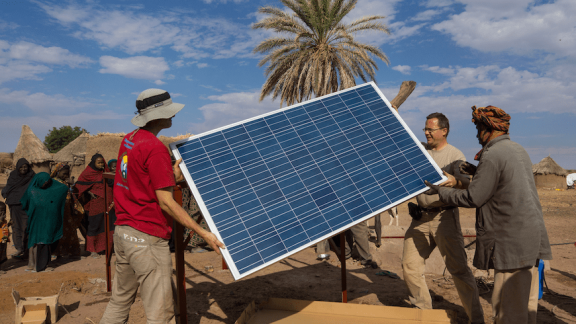KawiSafi Ventures Fund
Creating a new investment fund, KawiSafi, to drive off-grid solar power in East Africa. Investing in 10-15 clean energy companies, initially in Rwanda and Kenya, providing household solar technologies. Aiming to drive a low-carbon paradigm shift and leapfrog fossil fuel grids to clean energy, using equity capital from GCF to leverage investment, and grant capital to set up a Technical Assistance Facility.
Rwanda has 70% of its population living off-grid, and even a planned massive investment from the government will leave over 3.5 million without power. Energy costs are high, both for on- and off-grid customers, because of a heavy reliance on imported oil and kerosene. In Kenya, 80% live off-grid with 35 million without access to affordable and reliable electricity. Lighting costs in particular are very high for rural off-grid Kenyans, who spend around 26% of their income on kerosene, which is expensive, dangerous, and harmful to health. Rapid population growth is increasing demand for electricity and placing further demands on grid supply. The Fund will consider expansion to Uganda over time, which has even lower electrification levels and heavy reliance on fuel wood for cooking.
The KawiSafi portfolio will be the world’s first climate change fund targeting low-income populations in developing countries. Investments of USD 2-10 million per company will be made in 10-15 clean energy small- and medium-sized enterprises. Lack of electricity and high kerosene use will be addressed through affordable clean household solar energy solutions such as solar lanterns, solar home systems, and solar mini-grids. KawiSafi will also invest in other parts of the ecosystem such as consumer finance, mobile payment, and metering/monitoring technologies. The Technical Assistance Facility will identify and address core needs of portfolio companies to support their scale and financial viability.
The project has an estimated lifespan of 12 years.
Project timeline
Pipeline
23 Apr 2015 • 197 days
Concept note received
23 Apr 2015
Funding proposal received
21 Jul 2015
Approved
05 Nov 2015 • 286 days
Approved by GCF Board
05 Nov 2015
Cleared by iTAP
05 Nov 2015
Legal opinion on AE's Internal Approval
02 Mar 2016
FAA executed
03 Aug 2016
Under implementation
16 Aug 2016 • 3,297 days so far
FAA effective
16 Aug 2016
Disbursement - USD 5,353,584
07 Sep 2016
Disbursement - USD 140,329
19 Dec 2016
Disbursement - USD 466,544
03 Apr 2017
Disbursement - USD 466,544
21 Jun 2017
Disbursement - USD 1,563,816
22 Sep 2017
Disbursement - USD 154,778
05 Dec 2017
Annual Performance Report
30 Apr 2018
Annual Performance Report
30 Apr 2019
Disbursement - USD 154,187
08 Jul 2019
Disbursement - USD 448,484
18 Oct 2019
Disbursement - USD 2,280,781
07 Feb 2020
Disbursement - USD 1,648,547
20 May 2020
Disbursement - USD 700,000
12 Jun 2020
Disbursement - USD 143,816
31 Jul 2020
Disbursement - USD 131,258
26 Nov 2020
Disbursement - USD 136,830
01 Mar 2021
Disbursement - USD 606,181
29 Jun 2021
Disbursement - USD 141,308
15 Oct 2021
Disbursement - USD 1,962,839
15 Oct 2021
Disbursement - USD 710,714
15 Dec 2021
Disbursement - USD 574,513
20 Dec 2021
Disbursement - USD 846,429
23 Sep 2022
Disbursement - USD 1,140,007
30 Nov 2022
Disbursement - USD 914,286
07 Sep 2023
Disbursement - USD 444,708
11 Dec 2023
Disbursement - USD 415,061
09 Apr 2024
Disbursement - USD 111,177
26 Jul 2024
Disbursement - USD 914,286
12 Dec 2024
Disbursement - USD 266,825
28 Feb 2025
Disbursement - USD 281,648
24 Jun 2025
To be completed
16 Aug 2028 • 1,088 days to go
-
Financing
- Private sector
- Public sector
-
Size
- Micro
- Small
- Medium
- Large
GCF financing92% disbursed
| Instrument | Amount |
|---|---|
| Equity | USD 20,000,000 |
| Grant | USD 5,000,000 |
| Total GCF Financing |
|---|
| USD 25,000,000 |
Co-financing
| Co-financer | Instrument | Amount |
|---|---|---|
| Co-Financing | Equity | USD 75,000,000 |
| Co-Financing | Grant | USD 5,000,000 |
| Co-Financing | Equity | USD 5,000,000 |
| Total Co-Financing |
|---|
| USD 85,000,000 |
GCF Contacts
General media inquiries
GCF CommunicationsSend e-mail
Request for information
GCF Information DisclosureRequest information about this project
Project complaints and grievances
GCF Independent Redress Mechanism (IRM)Phone +82 32 458 6186 (KST)
File a complaint
Integrity issues
GCF Independent Integrity Unity (IIU)Phone +82 32 458 6714 (KST)
Send e-mail
Entity
More contacts
National Designated Authority
The National Treasury
Principal Secretary
Treasury Building 12th Floor, Harambee Avenue, Nairobi, Kenya
Programme Manager, National Coordination (FLLoCA)
Senior Policy Advisor, Climate Finance
Rwanda Environment Management Authority
Director General
Documents
| Title | Type | Date |
|---|---|---|
| 2023 Annual Performance Report for FP005: KawiSafi Ventures Fund | Annual Performance Report | 30 Apr 2024 |
| 2022 Annual Performance Report for FP005: KawiSafi Ventures Fund | Annual Performance Report | 27 Apr 2023 |
| 2020 Annual Performance Report for FP005: KawiSafi Ventures Fund | Annual Performance Report | 21 Aug 2021 |
| 2019 Annual Performance Report for FP005: KawiSafi Ventures Fund | Annual Performance Report | 30 Apr 2020 |
| 2018 Annual Performance Report for FP005: KawiSafi Ventures Fund | Annual Performance Report | 30 Apr 2019 |
| 2017 Annual Performance Report for FP005: KawiSafi Ventures Fund | Annual Performance Report | 03 May 2018 |
| KawiSafi Ventures Fund | Approved funding proposal | 22 Mar 2017 |
News + Stories

Reflections on climate action: How do climate investments impact people's lives?
05 Apr 2024 / "Stories are incredible...and this is why it's important to come...and witness the impact that these investments have on their lives...so that we can show the world why we need to scale these investments." — GCF Executive Director Mafalda Duarte, during her visit to GCF #climateaction projects in Kenya and Rwanda In September 2023, GCF ED Duarte visited Africa and saw first-hand the impacts of GCF-financed projects on rural communities.

GCF and KawiSafi Ventures Fund driving off-grid solar power in East Africa
05 Dec 2023 / Although the African continent is responsible for only three per cent of the world's human-induced greenhouse gas emissions each year, it is expected to suffer some of the most severe consequences of climate change. Significant investments in Africa's infrastructure, manufacturing capacity, and economy are necessary to helpthe continent's adapt and mitigate the effects of climate change.

Investment in off-grid solar lights up lives in Rwanda
01 Oct 2019 / In Rwanda about 70% of the population are not connected to the electricity grid. In partnership with Acumen in the KawiSafi Ventures Fund, the Green Climate Fund (GCF) is helping address this by unlocking private sector investment in off-grid renewables as a faster, cheaper, and cleaner way to bring power to Rwandan communities.





